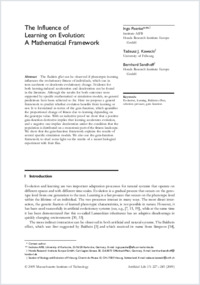The influence of learning on evolution: a mathematical framework
- Paenke, Ingo Institute AIFB, University of Karlsruhe, Germany - Honda Research Institute Europe GmbH, Offenbach/Main, Germany
- Kawecki, Tadeusz J. Ecology and Evolution, Department of Biology, University of Fribourg, Switzerland
- Sendhoff, Bernhard Honda Research Institute Europe GmbH, Offenbach/Main, Germany
-
2009
Published in:
- Artificial Life. - 2009, vol. 15, no. 2, p. 227-245
English
The Baldwin effect can be observed if phenotypic learning influences the evolutionary fitness of individuals, which can in turn accelerate or decelerate evolutionary change. Evidence for both learning-induced acceleration and deceleration can be found in the literature. Although the results for both outcomes were supported by specific mathematical or simulation models, no general predictions have been achieved so far. Here we propose a general framework to predict whether evolution benefits from learning or not. It is formulated in terms of the gain function, which quantifies the proportional change of fitness due to learning depending on the genotype value. With an inductive proof we show that a positive gain-function derivative implies that learning accelerates evolution, and a negative one implies deceleration under the condition that the population is distributed on a monotonic part of the fitness landscape. We show that the gain-function framework explains the results of several specific simulation models. We also use the gain-function framework to shed some light on the results of a recent biological experiment with fruit flies.
- Faculty
- Faculté des sciences et de médecine
- Department
- Département de Biologie
- Language
-
- English
- Classification
- Biological sciences
- License
-
License undefined
- Identifiers
-
- RERO DOC 12213
- DOI 10.1162/artl.2009.15.2.15204
- Persistent URL
- https://folia.unifr.ch/unifr/documents/301122
Statistics
Document views: 133
File downloads:
- pdf: 215
